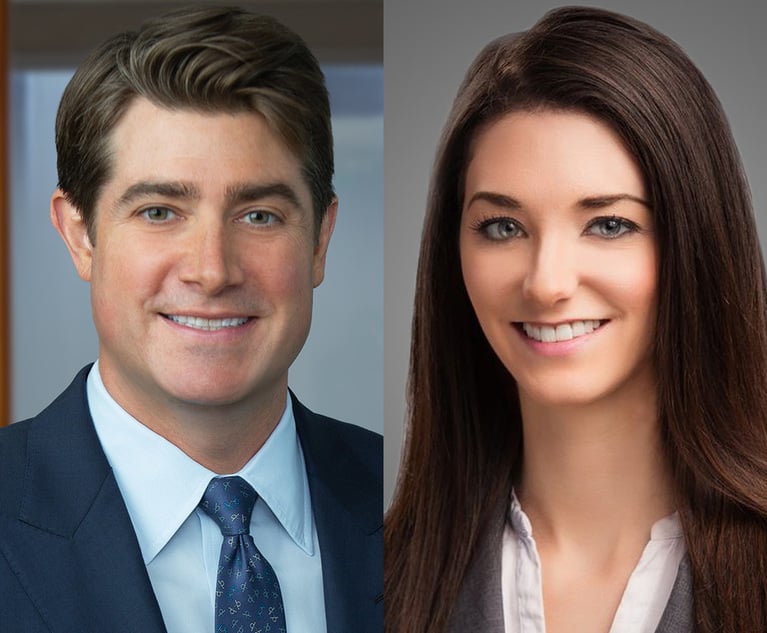Key Legal Ethics Developments to Keep in Mind as 2018 Ends
The bodies in charge of crafting legal ethics rules sought in 2018 to address a host of key areas related to changes in the practice of law, technology and societal norms.
December 26, 2018 at 06:50 PM
7 minute read
 Illustration by Fred Ho Yeow Hui
Illustration by Fred Ho Yeow Hui
As many legal ethics experts will tell you, the organized bar tends to lag behind changes in society, technology and the realities of practicing law today. Still, in 2018, the American Bar Association and state ethics authorities sought to update professional conduct rules to address several modern-day issues, such as attorney advertising, discrimination and data breaches.
Here's a look back at some of the notable legal ethics-related developments over the past year.
Lawyer Advertising Update
In August, at its annual meeting in Chicago, the ABA House of Delegates—a body of more than 600 with members from state, local and other bar associations and legal groups—adopted changes to its model rules of professional responsibility in a bid to simplify a complex set of regulations surrounding lawyer advertisements.
The changes included combining provisions of the ABA's model ethics rules on misleading statements into a single section and offering additional guidance on what lawyers can't say in an advertisement or other communication. Separately, the ABA tweaked the model rules related to referral payments, in which someone is paid for recommending a lawyer to a prospective client.
Those payments aren't typically allowed under the ABA model rules, with some key exceptions—and the body carved out a new exception in 2018 that allows for nominal “thank you” gifts “that are neither intended nor reasonably expected to be a form of compensation for recommending a lawyer's services.”
In the wake of the ABA's attorney advertising rule updates, lawyers with expertise in professional liability issues described the changes as a significant step toward streamlining and injecting clarity into what has, historically, been a confusing area of legal ethics marked by different regulations in different jurisdictions.
But the ABA's changes didn't address what could be the next front of ethics updates in the areas of advertising and solicitation: how the advertising and referral fee rules apply to social media networks or online lawyer review and referral services.
California Overhaul
As the ABA took up the attorney advertising rule changes—part of broader package of reforms up for consideration at the bar association's annual meeting in 2018—bar authorities and lawyers in California were gearing up for a slew of ethics rule changes to take effect in their state. In May, the California Supreme Court released the first comprehensive overhaul of the state's rules of professional responsibility in nearly three decades. The revisions took effect Nov. 1.
While the updated rules came in at 112 pages that California lawyers will need to review and heed in their entirety, a few highlights included provisions related to conflict of interest issues, romantic entanglements between clients and lawyers, and discrimination and retaliation.
On the conflicts front, the new California rulebook effectively made the ethics obligations broader and less specific to a given case, expanding the definition of what comprises a legal matter to better align with how lawyers across the country generally understand the conflict of interest landscape.
Elsewhere, the new California rules contained a change to provisions dealing with sexual relationships with clients. Previously, the rules prohibited sexual contact between lawyers and clients if the act was coerced or if sex was being exchanged for legal services. Under the updates, sex between a lawyer and client is generally verboten unless they had a consensual relationship prior to the representation kicking off.
California, a state often known for its progressive politics, also dealt with issues of discrimination, retaliation and harassment within the overhauled ethics rules—both in the practice of law and in a lawyer's workplace. There, among other provisions, the rules confer a responsibility on lawyers to “advocate corrective action” if they know of discriminatory or harassing conduct going on within their law firms.
Anti-Bias Rule Resistance
As is the case in a lot of states, the ABA's model ethics rules—which aren't binding on the profession, but often serve as a guide for disciplinary authorities—had an influence on California's overhaul. The California provisions on harassment, discrimination and retaliation serve as a specific example of how an ABA model rule made its way into a state professional responsibility code.
In 2016, the ABA adopted a model rule specifying that it is professional misconduct for a lawyer, while practicing law, to engage in harassment or discrimination on the basis of race, sex, religion, national origin, ethnicity, disability, age, sexual orientation, gender identity, marital status or socioeconomic status. But while California and at least one other state, Vermont, have adopted rules along the lines of what the ABA proposed, the bar group's proposal has met resistance elsewhere.
A number of states have rejected the model rule since its 2016 adoption, and in 2018 Idaho and Arizona became some of the latest to opt against it. Generally, the rule has drawn criticism on the grounds that it may curtail lawyers' free speech rights. Critics have also maintained that language in the rule is too broad and could reach into areas of lawyers' lives that shouldn't be subjected to the professional conduct code. Proponents, meanwhile, say it makes sense to encode the tenet that discrimination has no place in the legal profession.
With the actions in Idaho and Arizona, which took place in late August and early September, six states, including Louisiana, Nevada, South Carolina and Tennessee, have now rejected the rule. Some 13 states, however, were “studying” the proposed rule update as of Sept. 19, the most recent tally by the ABA.
Data Breach Obligations
Beyond attempts to match legal ethics rules to the modern-day realities of running a law practice as a business and to align them with societal goals such as stamping out discrimination, one key issue facing disciplinary authorities these days stems from changes in technology.
Along those lines, the ABA released a formal ethics opinion in October outlining a lawyer's obligations in the instance of a data breach that exposes confidential client information. Such breaches are both increasingly common and, because lawyers have access to a wide array of confidential information, present particular challenges for the legal community.
In the ABA's ethics opinion, the body suggests that lawyers who suffer a cyberattack would not necessarily face disciplinary action. Where they may run afoul of their obligations, however, depends on what they do to ward off a potential hack or to respond to one that happens. The ABA said that lawyers must take reasonable measures to prevent a hack or to attempt to detect a cyber intrusion.
The ethical guidance also directed lawyers to keep clients “reasonably informed” about the status of a data breach, with the goal being to give clients enough explanation that they can make an informed decision about whether to continue working with the lawyer or firm that suffered the breach.
Read More:
Five Things California Lawyers Should Know About New Ethics Rules
More States Reject ABA Anti-Bias Ethics Rule
ABA Says Lawyers Must Monitor for Data Breaches, Inform Affected Clients
This content has been archived. It is available through our partners, LexisNexis® and Bloomberg Law.
To view this content, please continue to their sites.
Not a Lexis Subscriber?
Subscribe Now
Not a Bloomberg Law Subscriber?
Subscribe Now
NOT FOR REPRINT
© 2025 ALM Global, LLC, All Rights Reserved. Request academic re-use from www.copyright.com. All other uses, submit a request to [email protected]. For more information visit Asset & Logo Licensing.
You Might Like
View All
White & Case Crosses $4M in PEP, $3B in Revenue in 'Breakthrough Year'
6 minute read
Haynes and Boone Expands in New York With 7-Lawyer Seward & Kissel Fund Finance, Securitization Team
3 minute read
'None of Us Like It': How Expedited Summer Associate Recruiting Affects Law Students and the Firms Hiring Them

Sheppard Mullin, Morgan Lewis and Baker Botts Add Partners in Houston
5 minute readTrending Stories
- 1DC Circuit Keeps Docs in Judge Newman's Misconduct Proceedings Sealed
- 2Litigators of the Week: US Soccer and MLS Fend Off Claims They Conspired to Scuttle Rival League’s Prospect
- 3Litigator of the Week Runners-Up and Shout-Outs
- 4U.S.- China Trade War: Lawyers and Clients Left 'Relying on the Governments to Sort This Out'
- 5Willkie Adds Five-Lawyer Team From Quinn Emanuel in Germany
Who Got The Work
J. Brugh Lower of Gibbons has entered an appearance for industrial equipment supplier Devco Corporation in a pending trademark infringement lawsuit. The suit, accusing the defendant of selling knock-off Graco products, was filed Dec. 18 in New Jersey District Court by Rivkin Radler on behalf of Graco Inc. and Graco Minnesota. The case, assigned to U.S. District Judge Zahid N. Quraishi, is 3:24-cv-11294, Graco Inc. et al v. Devco Corporation.
Who Got The Work
Rebecca Maller-Stein and Kent A. Yalowitz of Arnold & Porter Kaye Scholer have entered their appearances for Hanaco Venture Capital and its executives, Lior Prosor and David Frankel, in a pending securities lawsuit. The action, filed on Dec. 24 in New York Southern District Court by Zell, Aron & Co. on behalf of Goldeneye Advisors, accuses the defendants of negligently and fraudulently managing the plaintiff's $1 million investment. The case, assigned to U.S. District Judge Vernon S. Broderick, is 1:24-cv-09918, Goldeneye Advisors, LLC v. Hanaco Venture Capital, Ltd. et al.
Who Got The Work
Attorneys from A&O Shearman has stepped in as defense counsel for Toronto-Dominion Bank and other defendants in a pending securities class action. The suit, filed Dec. 11 in New York Southern District Court by Bleichmar Fonti & Auld, accuses the defendants of concealing the bank's 'pervasive' deficiencies in regards to its compliance with the Bank Secrecy Act and the quality of its anti-money laundering controls. The case, assigned to U.S. District Judge Arun Subramanian, is 1:24-cv-09445, Gonzalez v. The Toronto-Dominion Bank et al.
Who Got The Work
Crown Castle International, a Pennsylvania company providing shared communications infrastructure, has turned to Luke D. Wolf of Gordon Rees Scully Mansukhani to fend off a pending breach-of-contract lawsuit. The court action, filed Nov. 25 in Michigan Eastern District Court by Hooper Hathaway PC on behalf of The Town Residences LLC, accuses Crown Castle of failing to transfer approximately $30,000 in utility payments from T-Mobile in breach of a roof-top lease and assignment agreement. The case, assigned to U.S. District Judge Susan K. Declercq, is 2:24-cv-13131, The Town Residences LLC v. T-Mobile US, Inc. et al.
Who Got The Work
Wilfred P. Coronato and Daniel M. Schwartz of McCarter & English have stepped in as defense counsel to Electrolux Home Products Inc. in a pending product liability lawsuit. The court action, filed Nov. 26 in New York Eastern District Court by Poulos Lopiccolo PC and Nagel Rice LLP on behalf of David Stern, alleges that the defendant's refrigerators’ drawers and shelving repeatedly break and fall apart within months after purchase. The case, assigned to U.S. District Judge Joan M. Azrack, is 2:24-cv-08204, Stern v. Electrolux Home Products, Inc.
Featured Firms
Law Offices of Gary Martin Hays & Associates, P.C.
(470) 294-1674
Law Offices of Mark E. Salomone
(857) 444-6468
Smith & Hassler
(713) 739-1250










